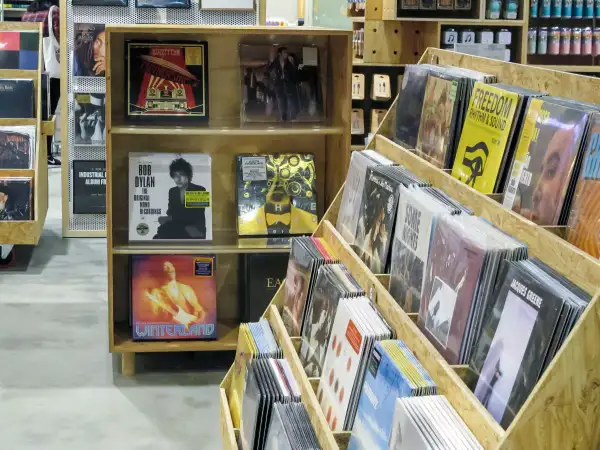You'll Never Guess What Store Sells the Most Vinyl Records

It's Urban Outfitters, the clothing chain that recently received grief and load of media attention by marketing a seemingly blood-stained—or was it just vintage and discolored?—Kent State sweatshirt, (The store has also in the past has sold controversial, ill-conceived designs such as a T-shirts with slogans like "Depression" and "Eat Less" and bottles that look like they hold prescription drugs.) Urban Outfitter stores have been selling vinyl records for years, in a campaign that's been so successful it's drawn imitators trying to attract hipster music lover customers. You can get vinyl with your kale at some Whole Foods stores.
Now Urban Outfitters is claiming to be the biggest seller of vinyl records in the world. “Music is very, very important to the Urban customer," CEO Calvin Hollinger said in a meeting with analysts this week (HT: Buzzfeed). "In fact, we are the world’s number one vinyl seller.”
At first glance, it might seem odd for a youth-focused apparel retailer to be in the business of selling music—especially one using technology that was considered old-fashioned and dying in the 1980s. But when you think a little deeper about vinyl records, and who's interested in them, the sales category makes more sense. For one thing, records tend to have a longer shelf life than fast fashion. No matter how many fashion cycles pass, people will still want to listen to (and buy) the music of the Sex Pistols and Bob Marley and the Ramones. It doesn't take up a whole lot of space in a store to hold a few hundred records, and the same customers who enjoy flipping through the albums are likely to be put in the mood for browsing other merchandise.
What's more, in many parts of the country, there are no record stores left, so Urban Outfitters is the only option left—a surprisingly good option, as many skeptics have found. "I kept finding more and more crates full of more and more records," one Village Voice writer stated regarding a shopping venture to Urban Outfitters last summer. "And pretty decent ones! And not super expensive (generally between $10 and $20)."
Perhaps most importantly, even as streaming has crippled sales of CDs and digital downloads, vinyl record sales are on the upswing. Nielsen data shows that for the first six months of 2014, vinyl LP sales were up 40% compared to the same period of a year prior. What's behind the surge in vinyl?
"Ask any number of your friends who collect and listen to vinyl records, and there's a good chance they'll tell you vinyl just sounds better than anything else," a recent Motley Fool post summed up. There's also the hipster factor, combined with nostalgia and the collectability of classic and obscure record album covers. "In short, vinyl is cool."
Also interesting: Starting in 2008, an event dubbed Record Store Day has been celebrated every April, in which more than 1,000 independent stores in the U.S. have special promotions and roll out new albums on vinyl for sale. The 2014 edition of Record Store Day was the most successful ever, with sales up 58% over the previous year's event, and up 91% compared to the previous week, according to Rolling Stone.
Last year, a Record Store Day imitation event was added to the mix, and its second incarnation actually takes place this Saturday in select stores. Something tells us it won't be quite as successful as Record Store Day, however. It's called Cassette Store Day.
